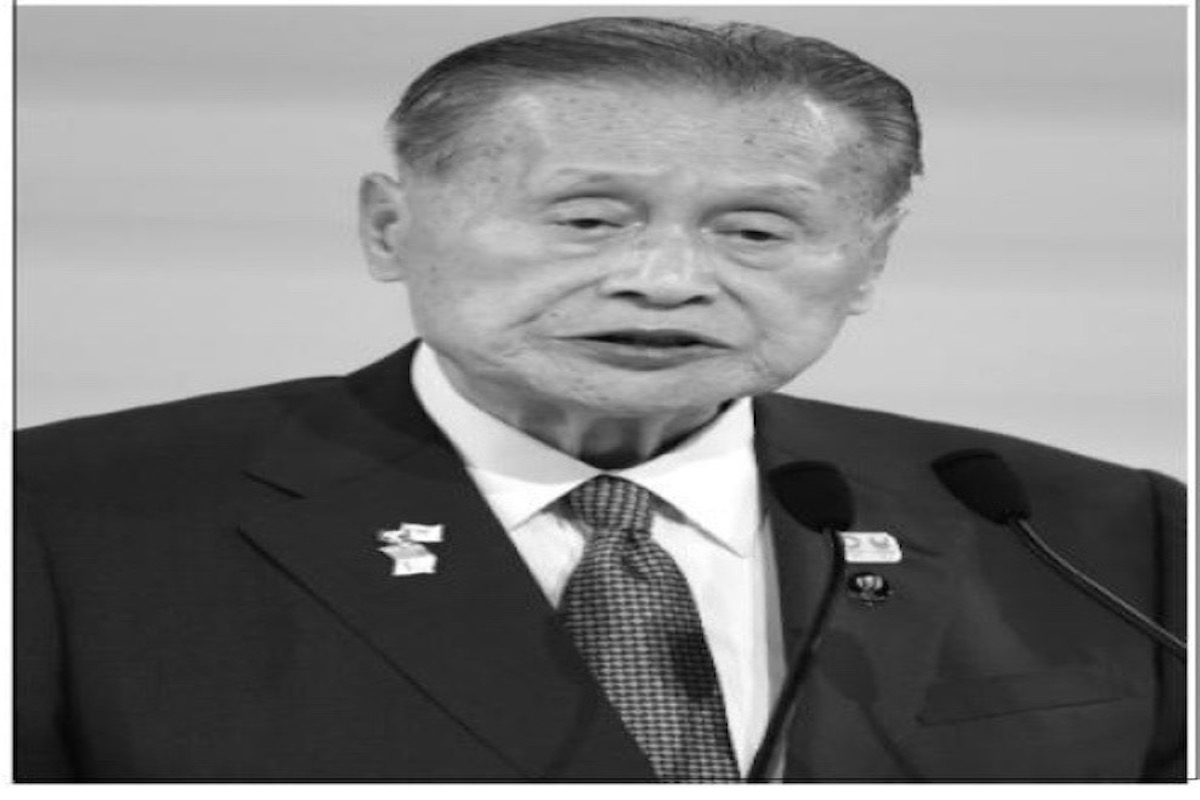Yoshiro Mori, President of the Tokyo 2020 Olympic Games Organising Committee resigned on 12 February, succumbing to an onslaught of criticism triggered by sexist comments he made earlier in February and with this sudden development, the future of the Games, which looked already uncertain because of the sudden spike in coronavirus cases, further drifts into uncertainty. The 83-year-old former prime minister was chosen by then Prime Minister Abe Shinzo and stayed in office for seven long years until his gaffe made him leave the office in disgrace.
Despite strong public disapproval and huge risk in hosting the event amid plenty of uncertainties, Prime Minister Yoshihide Suga is determined to host the event, thereby risking his political future. In the meantime and amid a global outcry, the troubled Olympics is searching for a chief to succeed Mori just five months from the start. The replacements are either Seiko Hashimoto, the Cabinet minister in charge of the Tokyo Games and a former Olympian or 84-year-old Saburo Kawabuchi, former president of the Japan Football Association, Mori’s choice. It could be nice if in a damage-control move, Seiko Hashimoto, a woman, is chosen by consensus.

What kind of sexist remarks did Mori make that provoked a wave of outrage domestically and internationally? In a meeting on 3 February with members of the Japanese Olympic Committee, Mori remarked: “If one (female) member raises her hand to speak, all the others feel the need to speak too. Everyone ends up saying something. If we increase the number of female board members, we have to make sure their speaking time is restricted somewhat, they have difficulty finishing, which is annoying.” The comments might seem innocuous but coming from a person holding such a high position, they were not in good taste.
Mori’s remarks were a reflection of the attitude of men towards women in Japan and a larger malaise in the country. Being a developed country, Japan has also retained many traditional values and cultures and that is beautiful. But peoples’ mindset does not change in certain spheres. In a male-dominated society, women continue to be seen as second-class citizens, no matter how high some rise in their professional careers. The number of female members in the Cabinet has never been more than two to three and even those ministers have to face sometimes indignities at the hands of their male counterparts. One can recall that a few years ago, a male Cabinet member had made a remark in the Diet that women are babymaking machines. It caused an uproar then and the minister had to put in his papers. One can cite several such instances where women are disrespected and humiliated by their male counterparts. Mori’s remark falls within such a narrative. But coming from an 83-yrearold, it was not only regrettable but in utter bad taste.
Mori did apologise but the damage was done. In protest, many volunteers withdrew their participation and many corporate sponsors are rethinking their support after so much controversy. Three runners in the Olympic torch have already withdrawn. More supporters from other areas are also likely to withdraw, constraining Suga’s hands further. Such negative fallout shall further erode confidence in the organisers’ ability to pull off the event during the pandemic.
The question that arises is how come Mori was felt to be “indispensable” and allowed to exercise huge influence in politics and sport after leaving active politics many years back. Being one of Japan’s most influential but controversial public figures, Mori’s exit in ignominy negated all his good deeds in a long political career. His sexist comments were condemned as inappropriate and contrary to the Olympic goals. Through his long political career, Mori had emerged a heavyweight with long experience, political connections and contacts, and had become a valuable fixer and intermediary for politicians and sports officials. Though Mori remained prime minister only for a year from April 2000 to April 2001 after his predecessor Keizo Obuchi died suddenly, he used his experience, connections and political clout and remained a highly influential figure. Though Mori officially retired from politics in 2012, in the faction-ridden politics of Japan, Mori had strong clout and is said to support the 98-member Hosoda faction (Hiroyuki Hosoda), the largest and most powerful faction within the party.
The popular Japan Times observed in an editorial that Mori should have quit or been forced out within hours of the appalling comments he made about women. The delay was because in a male-dominated society such as Japan, the political leadership did not consider Mori’s comments as severe enough to merit to demitting office. After initial hesitation, he quit when outcry against his comments became global.
Even during his short tenure as Prime Minister, Mori courted controversy with numerous offensive comments. Within a year of being in office, his approval rating had plummeted to 9 per cent. Yet, Suga extended his tacit endorsement to Mori’s comments initially before he declared the issue “closed”. The unmistakable support that the comments received from the elite was proof of Japan’s pervasive sexism. If one takes a long-term view, women’s empowerment in Japan has a long way to go and discrimination against women remains a structural problem.
In gender equality, Japan ranks 121st of 153 countries. In politics, just two of 20 Cabinet posts are held by women. Only 40 of 391 LDP parliamentarians or a little more than 10 per cent are women. One can see discrimination in employment in every sector. Howsoever senior a post a woman may hold, but while in office she is expected to serve tea/coffee to her male colleagues. Most women tend to accept such humiliations as normal and rarely complain. But that is changing fast and women are becoming more assertive of their rights and demand dignity in society. Japanese men are therefore expected to change their attitudes towards women, accord respect and treat them as equals. But gender equality remains a far cry and men are unwilling to share power with women. That must change.
Former Prime Minister Abe did try to change and give a political push through his “womenomics” to empower more women, but it did not yield the intended result. With falling birth rates and an aging population, there is a shortage in the labour force and Abe tried to unleash the hidden potential of women through his policies. Unless Japanese men change their mindset and bring in societal changes, no government initiative shall be enough. Mori’s sexist comments need to be seen in this context.












